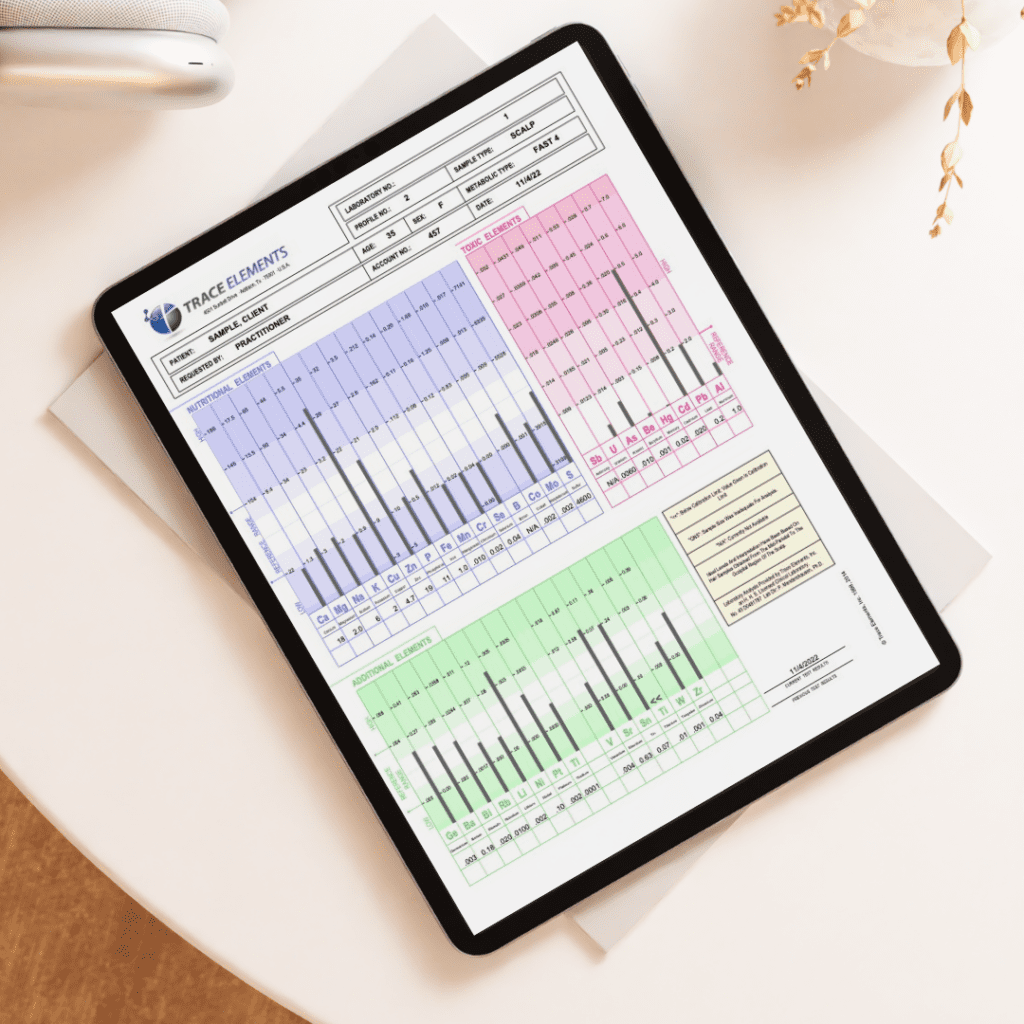Why Am I Doing Everything Right But Still Not Losing Weight?
Have you ever felt like you’re doing everything right with your diet and exercise, but the scale just won’t budge? It can be super frustrating! You might be cutting calories, hitting the gym, and trying all sorts of diets. But what if the real problem isn’t your efforts, but something deeper?
Many people overlook one crucial piece of the puzzle: nutrient deficiencies. If your body is missing essential vitamins and minerals, it can mess with your metabolism, energy levels, and even your cravings. This is why it’s so important to dig deeper and understand what’s really going on inside your body.
| Cause | Explanation | Impact on Weight Loss |
|---|---|---|
| Nutrient Deficiencies | Missing essential vitamins and minerals disrupt metabolism, energy levels, and cravings. | Slowed metabolism, energy crashes, and weight stalls. |
| Heavy Metal Toxicity | Metals like lead, mercury, and cadmium displace essential minerals like calcium and magnesium. | Mineral imbalances, inflammation, and difficulty losing weight. |
| Thyroid Dysfunction | Imbalances in calcium-to-potassium ratio slow down metabolism and thyroid function. | Low energy, fatigue, and weight gain. |
| Adrenal Dysfunction | Imbalances in sodium-to-magnesium ratio cause adrenal burnout, leading to stress-related weight gain. | Fat storage, fatigue, and poor stress response. |
| Blood Sugar Dysregulation | Imbalances in calcium-to-magnesium ratio cause blood sugar spikes and cravings for sugar. | Increased fat storage, especially around the belly. |
The Real Reason Fad Diets Don’t Work: It’s Not You, It’s Your Nutrients
Fad diets promise quick results, but they often fail to address your body’s needs. You might lose a few pounds at first, but without the right nutrients, your progress will likely stall. Your body needs a balance of minerals to function well. If you’re not getting enough, your organs, including the thyroid and adrenal glands, won’t perform their best.
Nutrient deficiencies can lead to energy crashes, cravings, and weight gain, making those diets feel like a waste of time. It’s not that you’re doing anything wrong – it’s that your body needs more support to succeed.

The Hidden Impact of Heavy Metals and Mineral Excesses on Weight Loss
One of the biggest, yet often overlooked, contributors to weight struggles is the presence of heavy metals or mineral excesses in the body. These substances can be incredibly toxic, and many people don’t realize just how much they can affect their overall health — including their ability to lose weight.
Heavy metals, like lead, mercury, aluminum, and cadmium, can mimic the structure and size of important minerals in the body. When this happens, these metals can actually “push out” the minerals your body needs, like calcium, magnesium, and zinc. This creates a deficiency in those essential nutrients, even if you’re eating a healthy diet. Without the right balance of minerals, your body can’t function optimally, and weight loss becomes an uphill battle.
But that’s not all. The accumulation of heavy metals in your cells, tissues, and organs can cause direct damage to these vital systems. When your body is overwhelmed with toxins, it leads to chronic inflammation, which is another major roadblock to losing weight. Inflammation not only disrupts your metabolism, but it also makes it harder for your body to burn fat, repair tissues, and regulate important hormones like insulin and cortisol.
In our nutritional programs, we take a targeted approach to addressing these imbalances by using specific minerals to gently guide the body toward detox. By supporting the body with the right nutrients and following a gentle detox protocol, we help strengthen the organs and systems responsible for removing heavy metals. This process is essential to getting your body back into balance and setting you up for successful, long-term weight loss.
While it can take time, the benefits of clearing these toxins and rebalancing your minerals are profound. Not only will you start to feel better, but your body will also become more efficient at maintaining a healthy weight, free from the toxic burden that may have been holding you back for years.
In the next few sections, we’ll dive into some of the key organ systems that can block weight loss when they’re not functioning properly. It’s important to remember that the minerals we’re about to discuss can be deeply affected by heavy metals and other toxins, which makes addressing these imbalances even more crucial for successful weight loss.
Is Your Thyroid Holding You Back? The Hidden Connection to Stubborn Weight
Now, let’s talk about your thyroid—the small gland in your neck that plays a big role in your metabolism. If your thyroid isn’t working properly, it can slow down your metabolism, making weight loss feel impossible. One common issue is an imbalance in the calcium-to-potassium ratio in your body.
When this ratio is off, it can lead to thyroid dysfunction, leaving you feeling tired, cold, and frustrated with your weight. Research from experts like Dr. Lawrence Wilson shows that testing your mineral levels, like through HTMA (Hair Tissue Mineral Analysis), can provide insights into how your thyroid is functioning. This way, you can address any deficiencies and help your thyroid get back on track. This is the primary test that we use in our practice. It helps us develop a targeted nutritional and detox protocol for our 1:1 clients.

What Your Adrenals Are Trying to Tell You About Your Weight Loss Struggles
Your adrenal glands are responsible for managing stress and keeping your energy levels stable. If you’re feeling drained, it could be due to adrenal burnout, which happens when there’s an imbalance in the sodium-to-magnesium ratio.
When your adrenals are struggling, your body tends to hold onto fat as a way to cope with stress. Dr. Bruce Eck highlights how crucial it is to support your adrenal health through proper nutrition. This means paying attention to your mineral intake. If you’re lacking sodium or overloaded with magnesium, it could be affecting your weight loss efforts.
By using a hair tissue test (HTMA) we can assess if our client’s adrenals are in adrenal burnout or are overactive – a particular nutritional approach needs to be taken in either case. There’s not a one size fits all solution. It’s crucial that an individualized and targeted protocol be created for and followed by each individual person.
Craving Sugar All the Time? Your Blood Sugar Might Be to Blame
Are you constantly battling cravings for sweets or feeling shaky between meals? This could be a sign of blood sugar dysregulation. An imbalance in the calcium-to-magnesium ratio can disrupt your blood sugar levels, leading to those frustrating cravings.
When your blood sugar fluctuates, it can cause your body to store more fat, especially around your belly. Understanding how minerals impact your blood sugar is key. If you’re feeling like you’re on a rollercoaster, consider getting an intracellular nutritional analysis (INA) or HTMA to check your chronic mineral levels. These tests may be more preferable than serum blood tests since they test for chronic mineral levels rather than acute levels. With these tests and a targeted nutritional protocol, you can find the right mineral balance, allowing you to manage cravings better.
| Solution | Explanation | Impact on Weight Loss |
|---|---|---|
| Hair Tissue Mineral Analysis (HTMA) | Identifies mineral imbalances that contribute to weight struggles. | Pinpoints underlying causes like thyroid and adrenal issues. |
| Nutrient Replenishment | Correcting mineral deficiencies restores metabolism and energy levels. | Supports optimal thyroid, adrenal, and blood sugar function. |
| Detoxification of Heavy Metals | Removing heavy metals helps restore mineral balance. | Reduces inflammation and improves metabolism. |
| Balancing Thyroid & Adrenal Hormones | Correcting calcium-potassium and sodium-magnesium ratios optimizes thyroid and adrenal function. | Helps stabilize energy, reduce stress, and promote weight loss. |
| Managing Blood Sugar with Minerals | Correcting calcium-to-magnesium imbalances stabilizes blood sugar levels. | Reduces cravings and supports fat metabolism. |
Why Testing for Nutritional Deficiencies Could Be the Missing Link
Many people spend years trying to lose weight without realizing they’re missing key nutrients that are holding them back. Certain diets may help you lose weight for a period of time, but if you’re like most people, that weight will creep right back up if nutritional imbalances or toxins are not addressed.
Testing for nutritional deficiencies, like with an HTMA (Hair Tissue Mineral Analysis) or an Intracellular Nutritional Analysis (INA), can uncover hidden imbalances that affect your energy, metabolism, and overall organ function.
Dr. David Watts, a leading expert in mineral testing, emphasizes that understanding your body’s mineral levels can make all the difference in your health journey. When you know what your body is lacking, a plan can be created for you to replenish those nutrients and finally see the results you’ve been seeking for so long.
How Imbalanced Mineral Ratios Affect Your Organs—and Your Weight
Minerals are like the fuel your body needs to run properly. When your mineral ratios are out of balance, it can cause your organs—like your thyroid, adrenal glands, and pancreas—to struggle.
For example, an imbalanced calcium-to-potassium ratio can slow your thyroid, while a sodium-to-magnesium imbalance can wear out your adrenal glands, leaving you tired and more prone to weight gain. These imbalances affect how your body uses energy, stores fat, and even manages stress. Addressing these deficiencies is crucial for restoring balance and supporting your weight loss efforts.

My Personal Experience with Clients and Weight Loss Struggles
As a nutritionist specializing in Hair Tissue Mineral Analysis (HTMA), I’ve worked with many amazing — yet frustrated — clients who have struggled with their weight for years. In fact, most of the clients who come to me are either overweight or obese, and almost every single one of them has some form of mineral imbalance that impacts key functions in their body.
Whether it’s affecting their adrenal function, thyroid health, and/or blood sugar regulation, these imbalances play a huge role in why they’ve struggled to lose weight — and keep it off. Sometimes, it’s one area, and other times, it’s a combination of all three.
In our nutritional programs, we focus on gradually restoring balance by providing their body with the specific nutrients it’s been missing. We also work to detox any heavy metals or excess minerals that could be contributing to their imbalances. It’s a systematic process that needs to be followed step by step.
One thing we always tell our clients is that weight loss doesn’t happen overnight. When we focus on restoring function to key systems like the adrenals, thyroid, and blood sugar regulation, weight loss becomes much more sustainable in the long run. We’re working to lower inflammation and strengthen their organs so they can support a healthy metabolism and weight over time.
It’s important to remember that while some clients do start losing weight early on, the real goal is healing their body so that it can maintain a healthy weight for the long-term — not just a quick fix. The process might take time, but it’s essential for true, lasting health.
Your Nutrient Deficiency Test Results: What to Expect and How to Use Them
So, you’ve decided to get tested—great choice! But what should you expect from your test results? When you get results from an HTMA or INA, you’ll receive a detailed look at your chronic mineral levels and ratios, showing you exactly where your body might be out of balance.
For example, if your test shows low potassium and high calcium, that could be a sign your thyroid needs support. If you’re low in sodium but high in magnesium, your adrenals might need help. Armed with this information, you can work with a practitioner to create a personalized plan to fix these imbalances and get your body back on track.
Learn more about what to expect from a hair tissue mineral analysis here.
Can You Really Fix Nutrient Deficiencies? Here’s How
Once you know what your body is missing, it’s time to take action! Yes, you can fix nutrient deficiencies, but it takes a targeted approach. It’s not just about popping a multivitamin—you need to focus on the specific minerals and nutrients your body is lacking.
Working with a nutritional practitioner trained to assess HTMAs, a custom protocol can be created for you that includes the right supplements, foods, and lifestyle changes to restore balance. Experts like Dr. Lawrence Wilson stress the importance of slow, steady progress. Fixing nutrient deficiencies isn’t an overnight fix, but with the right plan, you’ll start feeling more energetic, and weight loss will finally become easier.
Feel free to reach out to us to see if we currently have space in our programs!
From Deficiency to Balance: How Improving Your Nutrient Levels Can Transform Your Health
The journey from nutrient deficiency to balance can transform your health in ways you never expected. Once you start restoring those missing minerals, it’s likely that you’ll slowly but surely notice improvements in your energy, mood, and even your ability to handle stress.
More importantly, balancing your nutrients can lead to sustainable weight loss. Instead of constantly fighting cravings and energy crashes, your body will be more equipped to burn fat, support your metabolism, and maintain your weight long term. Addressing nutrient deficiencies is the key to breaking the cycle of yo-yo dieting and truly supporting your organ function and overall well-being.

Ready to Detox and Rebalance Your Minerals?
If you’re ready to tackle your weight loss struggles at the root, start by addressing what your body really needs. Our Low Toxin Lifestyle Guide is the perfect first step to help you reduce toxin exposure, and create a foundation for long-term health. Download it below today and take the first step toward vibrant health!
FAQs
What is the role of nutrient deficiencies in weight loss struggles?
Nutrient deficiencies can disrupt your metabolism, energy levels, and cravings, making it harder to lose weight despite your efforts.
How do heavy metals impact my weight loss efforts?
Heavy metals can displace essential minerals like calcium, magnesium, and zinc, leading to mineral imbalances that slow down metabolism and promote weight gain.
What is Hair Tissue Mineral Analysis (HTMA)?
HTMA is a hair test that measures mineral levels and ratios in your body, helping identify nutrient imbalances that may be impacting your health and weight loss. This test is non-invasive. You’ll collect your hair sample at home and it to an HTMA lab. This test must be ordered from a qualified practitioner.
How can HTMA help with weight loss?
HTMA provides insights into mineral imbalances, which, when addressed, can restore your body’s metabolic function and improve your ability to lose weight sustainably.
What is the calcium-to-potassium ratio and its impact on thyroid function?
An imbalance in the calcium-to-potassium ratio can slow down your thyroid, reducing metabolism and making weight loss more difficult.
How does adrenal health affect weight loss?
Adrenal imbalances, particularly in the sodium-to-magnesium ratio, can lead to fatigue and stress-related weight gain.
How can addressing blood sugar imbalances improve weight loss?
Balancing your calcium-to-magnesium ratio can help to regulate blood sugar levels, which then may help reduce food cravings and prevent fat storage.
Can nutrient deficiencies be fixed?
Yes, with targeted supplementation, dietary changes, and a holistic approach, it’s very possible to restore nutrient balance and support long-term weight loss.
What should I expect from my nutrient deficiency test results?
Test results from HTMA reveal mineral imbalances, helping you work with a practitioner to create a personalized plan for restoring balance and achieving sustainable weight loss.
References:
Relation between Thyroid Function and Mineral Imbalances:
Kohrle, J., & Jakob, F. (2018). Thyroid hormones and their interaction with other hormones: An update. Journal of Endocrinology and Metabolism, 103(4), 1408–1416. https://doi.org/10.1210/jc.2017-02300
Magnesium and Thyroid Function:
Rude, R. K., & Singer, F. R. (2014). Magnesium deficiency and its relationship to thyroid hormone function. Magnesium Research, 27(2), 55–60. https://doi.org/10.1684/mrh.2014.0371
Adrenal Function and Sodium-to-Magnesium Ratios:
Kloet, E. R., Joëls, M., & Holsboer, F. (2016). Stress and the brain: From adaptation to disease. Endocrine Reviews, 26(2), 118–132. https://doi.org/10.1210/er.2004-0015
Calcium-to-Magnesium Ratio and Insulin Sensitivity:
Barbagallo, M., & Dominguez, L. J. (2010). Magnesium and type 2 diabetes. Diabetes Care, 33(11), 2148–2154. https://doi.org/10.2337/dc10-1104
Hair Tissue Mineral Analysis (HTMA) Research:
Watts, D. L. (2012). The nutritional relationships of copper. Trace Elements Newsletter, 24(1), 1–6.
Intracellular Nutritional Analysis (INA) and Cellular Nutrient Levels:
Fields, C., Lewis, J., & Gala, S. (2019). Clinical utility of intracellular nutrient analysis. Nutritional Science Journal, 10(3), 145–152. https://doi.org/10.1093/nutri/nuz083
This article is for informational purposes only. It is not meant to diagnose or treat anyone. It is advised to consult your healthcare provider before taking anything new.
Please also note that a Hair Tissue Mineral Analysis (HTMA) is not intended to diagnose, treat, cure, reverse, or prevent any disease. It is not intended to replace any other medical test(s) that may be prescribed by your medical doctor.
